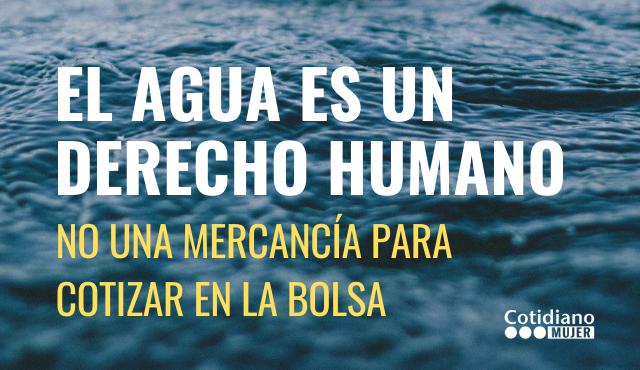Home → fancy clothes → Water: a merchandise...
Water: a merchandise or a human right?
The question of water is the highest priority in people's concerns.
"How can water and quality be supplied to the growing world population and, at the same time, guarantee the elimination of excess water from all human activities without damaging the environment?"
More than one billion people in the world do not have access to pure water, and about two billion lack these sanitary facilities.In the future, the amount of water will continue to be the same every year, while the number of people in the world increases, so the amount of water per person decreases, since the demand for water resources increases, which experts expect expertsthat decreases by 20% by 2030, as well as the predictions of the Arab Council for Human Rights that is described as "the water poverty situation."
Historically, the cities developed and prospered around the areas in which there was water available.Today, water is increasingly worrying.Population growth and clean water supply have become a source of conflict that threatens the future of the land population.
In addition to direct human consumption, water plays a vital role in the issue of food security, since all crops need water regularly to grow and provide food to the world.
The indiscriminate use of fertilizers and chemicals and the waste of fresh water sources, by rapidly extracting groundwater, contribute to water pollution, which implies a decrease in drinking water.
There is a general agreement that the water problem appears when the average per capita fee of water is less than two thousand cubic meters per year.
The reports published on the occasion of the "World Water Day", on March 22, 2001, confirmed that many border incidents related to water can become open wars due to the growing shortage of this vital natural wealth.
The most outstanding objectives of this event were to attract the attention of the world and its governments about the fact that the entire earth will be threatened by thirst in the mid -century, around 2050. The report warns that the misuse ofrivers and groundwater, pollution, waste, increase in population and chaotic growth of cities, all this will cause the current scarcity (less than 1,000 cubic meters per year per capita), which affects 250 million peopleIn 26 countries, it becomes a "massive thirst" that affects two thirds of the population of the Earth in 2050. The six billion inhabitants of the world currently use only one of every one hundred thousand of the planet's water, which representssalt water or inaccessible for 98% of them.
In order for the world to feed eight billion people and improve their social and health conditions from here to 2050, it must invest 180 billion dollars annually, compared to the 70 or 80 billion that are currently invested.
A French government memorandum indicates that "one billion people in the world lack drinking water, while 4,200 million people do not have the necessary structures to purify water."The memorandum adds that water is "the first cause of death and disease" in the world "directly or indirectly" and that three million children die annually due to the shortage of drinking water.
In a report prepared for this occasion, the World Health Organization caught attention to tropical diseases transmitted by mosquitoes and flies in humid areas, diseases that are directly or indirectly related to contaminated water consumption.
To the social and health problems of the water, the food agriculture must natural disasters.
There are also geopolitical problems, since two thirds of the world's main rivers and lakes are shared by more than one country, as well as environmental problems, since half of the rivers and water masses are contaminated.This water is distributed absolutely unevenly, since 23 countries are distributed two thirds of water resources, while the remaining third is distributed unequally for the rest of the countries.
Estadísticas que alertan de un peligro inminenteWe are currently facing a world emergency in which more than one billion people lack a basic supply of clean water and more than two billion lack adequate sanitation, which constitutes the main cause of water -related diseases.
On the other hand, lakes, rivers and glaciers from around the world are constantly reduced, and the growing pressures of the population, economic growth, urbanization, climate change and deforestation are weakening water sources and causing social social revoltsAnd economic, but this is not an inevitable result.
In fact, if we observe the map of the world, we find that the seas and oceans cover 70.8% of the total area of the planet, with an average depth of 3.73 km.35% of its total area.
ç
Although water covers 70% of the world, the proportion of fresh water does not exceed 2.5%, and the proportion of salted water reaches 97.5%, and the caps and glaciers constitute about 70% of the total volume ofFresh water, where many factors lead to water scarcity, such as population increase, global temperature and other emerging factors that make water a profitable good that many private sectors rush to exploit.Another defender of the right to water maintains that the legal obligation derived from the decisions on the right to water would motivate both the governments of developing countries and those of donor countries to make effective changes in national and aid policies and in help and inThe allocation of resources, and would give citizens groups a more solid basis on which to exert pressure on governments.
According to the United Nations 2012 Nations report on the Millennium Development Goals and to give a clearer idea of the impact of water on human life, 783 million people (that is, 11% of the world's population) do not haveAccess to improved sources of drinking water, since every 21 second a child dies for this cause and every year 443 million class days are lost due to water -related diseases.
Unfortunately, all this is concentrated in areas where there is no water, such as sub -Saharan Africa, where 40% of the population lives without drinking water.At present, water crises are not only in their shortage, but in access to their sources.
El problema de la contaminación del agua Cada año se vierten en los ríos 200 millones de toneladas de residuos humanos. 1.200 millones de personas no tienen más remedio que defecar en la naturaleza, y 2.500 millones de personas, más de un tercio de la humanidad, utilizan retretes que no ofrecen garantías contra los brotes de enfermedades relacionadas con las heces.The World Health Organization (WHO) estimates that 80% of deaths from diarrheal diseases are the result of poor sanitation and access to safe sanitation.And things move slowly to the invisible scale of the problem.
En 2050, se prevé que la población mundial alcance los diez mil millones de personas que comparten la misma cantidad de agua disponible en la actualidad. El resultado será que el 40% de la población mundial sufrirá de una manera u otra la escasez de agua y los conflictos armados serán la forma de obtenerla. El mundo árabeA study by the Arab Center for Studies of Arid areas and lands states that 13 Arab countries are in danger of water, where the annual per capita average is less than 2000/1000 mm3.
According to the United Nations Water Program, in 2025, two thirds of the world population will suffer from water danger, including all Arab countries, and eight of the countries in the region will have the least availability of per capita water in the world.
This occurs at a time when the Arab world does not use more than 5% of its water reserves and desalinizes 10.9 mm cubic mm of which cubic 4.5 mm are desalinated, and cubic 6.4 mm are sewage are wastewater, agricultural, agricultural, agriculturaland industrial, instead of the presence of 60% of Arab waters under the control of non -Arab countries, including Israel.
One of the most important challenges faced by Arab countries and that affect their security system is the issue of water threat, since the Arab world is characterized by the shortage of their water resources, since the largestPart is in dry areas, which are characterized by irregular and unpredictable rainfall indices.
The volume of total water resources in Arab countries is estimated at about 238,000 million cubic / year, which represents approximately 0.8% of the total renewable water resources around the world.Agriculture leads the list of sectors that consume water in the Arab world and is estimated to represent about 88.8% of the total use of water;This percentage is greater than 90% in Syria, Iraq, Oman, Yemen, Sudan, Somalia, Morocco and Mauritania.
Mauritania is considered one of the poorest countries in the world in water.Since the independence of the country, comprehensive water access has been impossible, since it is part of the arid and hot region of the Sahel.Studies in this regard indicate that Mauritania is the most fragile country in water and its water sources are the least stable in the world.The Middle East countries do not suffer a short and direct water scarcity.Therefore, violent conflicts will arise from the dispute of issues related to borders or internal affairs.
En el LíbanoIn Lebanon, access to water is one of the vital problems facing the Lebanese daily.The Lebanese State is considered one of the richest countries in the region in natural water resources, but wealth management remains the main dispute suffered by the Lebanese Republic, as well as other sectors.
The Ministry of Energy and Water of Lebanon had previously determined the need for irrigation water, including waste in traction networks, in 8000 m3 in 2015, compared to 10,000 m in 2000, and consumption is expectedof irrigation reaches 6000 m3 in 2030. Based on the same data from the Ministry, the water balance in Lebanon and demand management for 2005 were the following 900 million m3 for irrigation, 150 million m3 for theIndustry, 501 million m3 drinking, a total of 1,550 million m3 per year.
Ministry's expectations indicated a duplication of these figures by 2030. From this premise, future projects were launched in this context, the most important of which is the Gold Blue Project with the concept of inclusive economy, which will provide 500Millions of M3 in 2020 through the construction of dams, the refining of water, the quality control and the collection of rainwater, the afforestation and adoption of drip irrigation.Since 87% of the financial resources of the Lebanese State are malgantish, such as salaries, salaries and benefits without real investments.
Acuerdos relacionados con el aguaThe competition exists in the short term, since the use of water by one person deprives another to benefit from it.Internationally, the issue is not related to the difference between supply and demand, but to the difference between demand and the rhythm of renewal of water resources.In this case, competition between countries arises and intensifies due to the pressure of population growth.

In this context, bilateral relations between countries have witnessed the conclusion of bilateral water sales agreements in recent years, as indicated below:
Between Turkey and Israel: on March 25, 2004, 50 million cubic meters of purified water per year will be sold in Turkey for twenty years.Water will be extracted from the Manavgat River, in Turkey, and will be transported in oil tankers to Ashkelon, in Israel.Jonathan Peled, spokesman for the Israeli Ministry of Foreign Affairs, commented at the time that this historical agreement would turn water into an internationally accepted merchandise, and added that this indicates that the idea of importing fresh water is not one of the academic ideas of the future.
An agreement between Lesoto and South Africa was also closed to sell water as merchandise from Lesoto to South Africa at the rate of 88 cubic meters per second. An agreement between Iran and Kuwait was closed worth 2,000 million dollars (June 2001), in thethat water pipes crossed from northern Iran to Kuwait.
There are also cistern ships that transport water in the Caribbean and the Philippines.
In Canada, a strong controversy exploded on the export of large amounts of water when the global Canadá Water Corporation hired the shipment of 58,000 million liters annually of glacial water in Alaska through huge tank ships that will be filled in bottles in the free trade zonefrom China.It is considered that this project would benefit from China's cheap labor and obtain important profits as a result.
But as Canada is a member of the World Trade Organization and the North American Free Trade Agreement block (NAFTA), which includes the United States, Canada and Mexico, has had to adhere to the same rules of liberalization of the trade of trade asInternational organizations to make water a marketable good like any other.
Soluciones tradicionalesThe United Nations Report of 2012 confirms that the situation can improve radically and by simple means even in the poorest countries, such as water sterilization (by chlorine or exposing it in bottles in sunlight for hours) and personal hygiene, without waiting for advanced networks of distribution, irrigation, treatment and purification so that this water is not contaminated and potable.
Various reports insist on the need for the private sector to assume greater responsibility in the financing of operations, at a time when this sector does not currently provide more than a quarter of them.To achieve greater efficacy within the framework of long -term water investments, and to avoid the shortage of equipment, reports recommend the creation of an "International Water Bank" that occupies, finance and guide water projects inthe world.
Unlike other resources, water is a very important and very cheap resource to expose it to the random and expensive wars of appropriation and occupation.Transporting water from long distances is hard work and puts the buyer in a weakness of weakness, so it is considered a local solution that is used when all solutions have been exhausted.
But even if our consumption of water is rational and we change our consumption and production habits, this is not considered sufficient to meet the growing demand for water.The process of desalination of seawater has achieved important achievements, which predict encouraging results for the future of humanity, whose population increases in coastal areas.This process has flourished since the price of desalted water became competitive (around half a dollar per cubic meter at best).Maybe it is worth pursuing "supposedly real" water markets, that is, the water that is saved by importing a product instead of cultivating it in the country, although the countries of the region are reluctant to renounce their food independence.
Among these solutions and water savings measures, which we continue to need, governments are adopting a series of water -related reform policies, which vary from one society to another, and are affected by several other factors related to the situationGeological and environmental, the current wealth on the ground, the difficulty of accessing it, its cost and its quality;as well as the financial situation of governments and their technical and social capacities to accept change, its limits and its impact on all components of the State and the Nation.
Políticas de reforma del aguaWater is perhaps the most universal good and the essential ingredient for the creation of any civilization.
Historically, the cities developed and prospered around the areas in which there was water available.Today, water is a growing concern.Population growth and clean water supply have become a source of conflict that threatens the future of the land population.
There is still an urgent need for long -term solutions for this problem, since private countries and companies spend billions in pipelines and gas pipelines that extend through countries to provide these valuable products, but there seems to be no incentiveEconomic or commercial to provide similar projects to save water, even though its importance for life.
Water pumps can access groundwater, and sea water and oceans can be described and taken from abundance areas to scarcity.These solutions are expensive, but are possible as a way to provide clean water that increases water reserves and eliminates its shortage.
The resources destined for water are insignificant compared to financial resources.Water should be the basis of agricultural, energy, health and educational policies.The problem now is that who uses water does not pay it, such as the agricultural industry.They do not pay the real cost.If they had to assume the cost, they would have used it more effectively.Water managers are not the ones who make decisions.Rather, it is the heads of state and government who have the duty to assume the matter, and all this conditioned or not being managed efficiently and consciously.
Who should manage water: the government, the market or an active group of citizens?
Public services are a good example of fair management of resources.Non -governmental organizations work outside the government and the market, but have relations with both, so they can activate public morals, hold politicians responsible and show weak policies.Water is a complex problem that represents different issues in different countries, so each country has to prepare its own plans to do the right thing.We must pay for her.When you are scarce, we will pay more.We must educate more people to protect water.
Water reform policy should be based on basic concepts, the most important of which are
A - Find the best ways to take advantage of the available water resources, before contemplating the establishment of new water collection projects, and this includes activating all the mechanisms to preserve current resources.B - That the water sector enjoy a policy that offers encouraging conditions, which motivates the action, that motivates the reform and that allows to intervene directly before the water crisis.C - that is given to the local and regional initiative the opportunity to deal with the water crisis, with institutions and more flexible administrative bodies and more quickly responded, provided that market mechanisms are given an adequate space in these efforts. Economic scarce, since they see that the behavior of water consumption, so far, lacks, in its entirety, of rationalization, with the consequent waste It has a tangible aspect of human water wealth.
Señales de cambioFinally, and perhaps it is not too late, the human being begins to turn to water, has discovered that his aquatic future is more or less threatened, and that most of the world's problems float on the surface of the water.Water is more important for us than anything else, and yet it remains one of our lowest national priorities, and we do not mention it in our economic plans rather than scarcely, despite the fact that water occupies the first place between resourcesNatural, the center of attention and ambition, in a world whose climate is turbulent, and drought zones expand in its dry land year after year.
Some phenomena that indicate the growing tendency to consider water as merchandise have been observed.
The debate on water as merchandise began since the issuance of the 1992 Dublin statement, and it stipulated in its third paragraph that "water has an economic value in all its concurrent uses, and it must be recognized that it is an economic good".This adds to the text of the declaration on the fundamental role of women, in their home and in the raising of their children and in the orientation to provide, manage and maintain water, protect the environment and all vital resources, doingemphasize that fresh water is a limited and necessary resource for the continuation of life, development and the environment.
Then, this trend has continued and intensified when treating water as an economic good that is bought and sold in water markets, with the exchange of water rights between users.In fact, "water rights" apply in the United Kingdom, Australia and the United States as outstanding examples in this area.
Despite the great importance of water as something vital for life and for all societies, the news has been repeated with the arrival of the 21st century, and repeatedly in recent years, to confirm new trends in change in methodologyto treat water as a marketable good, something that is sold.The privatization of water services in the light of globalization that is being produced worldwide has opened the door to the conception of water as a service and as merchandise, so that water is no longer seen as a gift from God (or of the State), but as an essential good for which you have to pay.
Some academic circles and intellectual forums in international conferences also tried to promote the idea that water during this century will become a merchandise that will be bought and sold, and that has water markets or its own stock exchange in which they are negotiatedWater instruments and speculate on their current and future prices, similar to how it is done with strategic merchandise such as oil.This idea has been revealed in more than one event, in relations between countries and in international forums and conferences.
This transformation introduces water into the broad economic forces of the market that affect the strategic policies of the countries.The question of water, in particular, has taken the center of the international scene due to its proximity to the danger line, as well as its strategic importance and its important role in the geopolitical map.
This phenomenon has grown spectacularly during the twentieth century with the growing fear of water scarcity and pollution and environmental degradation derived from the misuse of water and the policies of destructive governments for the environment.
Water commercialization, although it is not a new phenomenon, is part of a more modern approach to market -based water management and provokes different attitudes of approval and rejection by interested parties.
The predominant pattern of water consumers, international organizations and civil society institutions in the world finds with great dissatisfaction the idea of considering water as an economic resource.Is it admissible that water becomes a merchandise?
There is no doubt that water is a resource of life that has existed on earth since its creation, and that has found many resources with different faces and uses.Man has invested and developed these resources based on his vital needs.He has then proceeded to improve them, domesticate and coordinate them to conform to their demands, tastes and luxury yearningLife, including food, drinking, clothes and walking, and even its wealth and social status.
The most prominent characteristic of contemporary lifestyle today is the large number of studies that focus on health and food, with a special approach to the importance of water in the diets we follow, and more than that, the typesof water, its quality and its special composition for each type of diet, which would support this diet or those in the achievement of its objectives.This trend has created a new concept to treat water and how to consume it, which is the concept of transforming water from a raw resource into an economically commercialized merchandise.This process was considered as "commercialization", the commodification of water.
In addition, contemporary civilized development, the volume of pollution caused by the human being, the strict control of the water flow and the increase of the standard of living as a consequence of economic development, made necessary the treatment, purification and bottling of water forPotable or sanitary uses, which enabled its circulation as merchandise, to cover the additional costs required by water preparation with the desired formula, but without transforming water into a merchandise that can be bought and sold in its natural form.
Aunque los líderes mundiales han reconocido que el acceso al agua potable es un derecho humano fundamental, también han reconocido que el principio de recuperación de costes debe aplicarse al uso del agua más allá de esas necesidades. Los sistemas no serán sostenibles si no se invierte en su mantenimiento y ampliación para satisfacer las necesidades del desarrollo y de la creciente población. Diferentes posiciones sobre la cuestión de la mercantilización del aguaThose who wanted water to be a preserved human right argued that if it was an economic good, the poor could not afford it.It is not admissible that nobody looked with something without which we cannot live.
Economists have argued that water is a merchandise.
In July 2010, the United Nations General Assembly adopted a resolution in which the right to drinking water and sanitation is recognized, as a fundamental human right.(between 50 and 100 liters of water per person a day) whenever it is safe and acceptable, at a reasonable price (the cost of water should not exceed 3% of household income), and that is really accessible (the sourceof water should not be located less than 1000 meters from the home, and the time to obtain it does not exceed 30 minutes).
The Universal Human Rights Declaration of 1948 affirmed that water is one of the basic human rights, a right guaranteed by international laws.This was explicitly declared in the Convention on the Rights of the Child of 1999.
The United Nations Committee on Economic, Cultural and Social Rights (November 2002) referred to the right to water as something inherent, and that every person has adequate, cheap, physically accessible, secure and acceptable water for personal and domestic purposes for personal and domestic purposes . In General Observations No. 15 of the Committee, issued under the title "The Right to Water", articles 11 and 12 of the International Pact of Economic, Social and Cultural Rights mentioned the concept of water management in the sense that it is not limited to the economic dimension only. It must be enforceable and feasible, given that all states exercise control over a wide range of resources, including water, technology, financial resources and international assistance, such as all other rights of the pact. The resolution also makes it clear that The adequacy of water availability should not be interpreted strictly, that is, only in terms of volume and technologies. Water should be treated as a social and cultural good, not as an economic good. This indicates a change towards market -based policies that show the true cost of water, reduce subsidies and have the potential to involve the private sector in water supply services.
Regardless of the mandatory resolutions of the United Nations to emphasize the right to drinking water and sanitation, as confirmed by the competent authorities in July 2010, this resolution, which was ratified by some 178 countries around the world, it is still the subject of controversy and a broad disagreement between the countries that ratify it and those that oppose it, in the midst of a state of mutual justifications for those countries separately.
The debate and controversy on this subject intensified in the V World Water Forum held in Istanbul (Turkey) in March 2009, which represents the largest meeting (2,300 people) and is a kind of diplomatic conference that brings together intergovernmental groups ofHigh level, ministers and parliamentarians, as well as NGOs.It is celebrated every three years.
The heated debate on this issue in the V World Water Forum frustrated the adoption of its final statement.It was not possible to reach the final declaration issued by the ministers due to the attempt of France, Spain and many Latin American countries to modify the declaration by adding the phrase "access to drinking water" as a human right instead of the word "need for water";In vain, to the point that twenty countries signed a statement of protest, including France, Spain, Switzerland, South Africa and Bangladesh.
The announcement criticized the French Environment Minister who declared and described as a lack of political will, necessary to guarantee adequate drinking water, at a time when about 80% of developing countries suffer from all diseases due to contaminated water. Analysis
The water problem is closely related to the rest of the problems of our stressed world, all caused mainly by the rapid increase in its population.More population means the need to provide more food and more energy, and these two things end with the need for more water resources.
Given this complex network of intertwined problems, the solution will only arrive through a general framework of a global policy that works to intensify investments and technical data, and to coordinate local and regional efforts.
The direct reason why most of the inhabitants of this world are accustomed to water waste behavior is that water reaches their homes almost free.Therefore, it is necessary to involve citizens and make them participate in the real water situation.
In fact, this vital service has a cost that includes (1) environmental cost. (2) Water supply cost. (3) Cost of water use. (4) The cost due to exhaustion or almost exhaustion of a water resourcethat is being used.
¿El agua es un derecho o un bien?Historically, water is a human right, and in the past people usedSupply cost, instead of going to the water source and doing their needs by itself.The State has the right to collect the cost of water supply to citizens.The citizen pays the water invoice, not as a price of water, but as part of the cost of water supply to citizens, in which the government takes over most.
The human relationship with water from the beginning of creation did not consider or treat water as a merchandise as other natural resources such as minerals, oil, stones and others, but considered it a natural resource available to humanity,Like air, which means that it gives life and creates the conditions for its prosperity.
But contemporary civilized development, the volume of pollution caused by the human being, the iron control over the flow of water and the increase of the standard of living as a consequence of economic development, made necessary the treatment, purification and bottling of water forPotable or sanitary uses, which enabled its circulation as merchandise, to cover the additional costs required by water preparation in the desirable formula, but without transforming water into a merchandise that can be bought and sold in its natural form.
The truth collides with the available amounts of water.Water scarcity set aside the concept of "water as a right" and turned it into a valuable merchandise that can be sold and buy.We live at a time when it is no longer possible to obtain the water from the springs that circulate.Rather, you have to sterilize and pump it to water networks, or extract it from underground wells, treat and distribute it.The Government usually assumes most of the costs of water supply to citizens, and the rest must be assumed by the citizen.The competent authorities spare efforts to supply water, but the lack of available water distorts the service provided, transforming the vision of the citizen of water as a merchandise.
In addition, when the shortage leads to the citizen to buy water for daily domestic uses, the right can disappear and the water will become a merchandise.Describing water as an economic good leads to a change in market -based policies that show the true cost of water, reduce subsidies and have the potential to involve the private sector in water supply services.
Therefore, water is considered in various parts of the world based on the fact that it is a human right and a renewable natural resource.However, this concept is declining in the face of population growth and the increase in water demand for various purposes, and the predominant concept has focused on the natural right of man to have water to meet their basic needs and maintainHealth in general, with the exception that the disposition of water requires taking into account the economic costs of its supply and the benefits resulting for the community.
Within the framework of this principle, the water economy is one of the important aspects in the management of water affairs, and decision making related to investment in water and the determination of policies related to the use of water for variouspurposes requires that water be considered a scarce economic good that must be treated according to policies and procedures that guarantee obtaining the desired benefits, taking into account that the benefits of water are not limited to the amounts used, but also to their quality.It is necessary to consider water as an economic good, taking into account its distinctive characteristics and features.Among these characteristics: water differs from other goods because it is necessary and vital for human life and important to achieve sustainable development in all its economic, social and environmental aspects.
Renewable natural water is distinguished from many other basic products in which it is replenished annually in limited amounts that are characterized by sudden fluctuations sometimes, which give rise to droughts or floods, and in both cases to the consequent losses and damages according to the severity of each
Water is distinguished by being a heterogeneous merchandise due to the different technical specifications that are required to be available for different uses, such as drinking water whose specifications differ from those required for agriculture or industry, and there is no alternative to its uses,Either to drink or for agricultural and industrial purposes, in addition to being a final consumer merchandise.This is the case of drinking water, in addition to being an intermediate merchandise for the production of other goods, such as its use in agriculture or industry.
In conclusion, it can be said that water is an economic good when it exceeds the needs of the human being, and can be treated on this basis.
Los pros y los contras de la mercantilización del aguaAs a result of the policies aimed at controlling the waste and preserving existing water reserves, and thus guaranteeing a safe future for humans, water has become a merchandise in many parts of the world.The application of this policy varies from one society to another and from one State to another.There must be controls that preserve the rights of all groups that make up a certain society with its own structure.The norms applied to rich societies cannot be applied equal to poor or medium societies.Rather, the core of the beginning is taken and turns to adapt to this or that society, also taking care to meet the demands and needs of each class of this society.
If you have to put a price on the water, the water price structure must be organized so that it guarantees the fulfillment of a double objective: economic efficiency and social justice in areas with a multicategorical social structure, so that it is accessible to classes for classesLow, without being completely eliminated.The individual's contribution to this low price is necessary to develop the sense of the value of this product, either to buy it in the market or for domestic water.It must also have a participation in the established water rate for domestic use, which plays a very important role in reducing waste in the use of water destined for all daily needs.
There are two erroneous beliefs, namely:
The first belief is the free of water, which raises all the social and environmental responsibility of the consumer, so it serves as an veiled stimulus to despise all the social, cultural and environmental values that also take into account the rights of others, sinceThe waste deprives others of a resource that would have been available without this irresponsible approach.
The second belief is to pay the consumer to participate in its entirety, which carries him and makes him feel unequal and in the absence of the sponsor state responsibility towards him, so he seeks in various ways to evade this weight and avoid thisresponsibility.
As for the best way to apply this policy, it is to adopt a compromise solution in the reasonable consumer contribution to the fertilizer rate, of which the State assumes most.The accountant represents the fairest solution in determining the responsibility of each consumer individually based on their global sum, which controls according to their needs and capacity, according to the unfolding that determine the rate on the percentage of consumption in ascending wayaccording to its gradual need, from urgent to less urgent and then above the acceptable limit.Each consumer considers what is convenient.In this way, he enjoys this right without keeping his part and that of others, and without depriving the subsequent generations of a crucial resource for his survival.
And this step cannot be basically accepted without being accompanied by a wide and effective media aware an encouraging government policy and at the same time restrictive and punitive, giving its official force to force the citizen to what is already demonstrating their existence and developing their citizenship through their respect for their environment and their rights, as well as the rights of The others, and their respect first to their own citizen final.
As for the positive aspects that derive from the conversion of water into a merchandise, the most important is the material technical process that is in its nucleus, and cannot be without it.In practice, water commercialization requires first collecting it, then purifying it of impurities, then supplying the necessary mineral salts and minerals in accordance with international standards, and then packing it, transporting it and selling it.As for the most important part, we purify it humanly to make it drinkable, thus moving the ghost of pollution and diseases of this basic product, even at a price.In addition, taking into account the quality in terms of composition, which is legally subject to international standards, thus gaining this water an undoubted credibility and, consequently, greater confidence and more conviction in the right of its value.
In the economic aspect, especially the sanitary, which is an indisputable priority.As for the social, it should be noted that the world rate for water consumption today is 917 cubic meters per year, that is, four times more than in 1950. Therefore, provide water with a material value avoidsIts misuse and increases the social responsibility of the individual, as well as environmental consciousness, not only towards water, but towards all sources of energy and production, not only because water is included in all its production, but because it becomesAn approach that is unconsciously adopted in the totality of social life and in treatment with others, including individuals, rewards and all components of life.
It is clear that commercialization has an inevitable economic benefit in the short and long term.It improves the status of the State and supports it both internally and externally, thus gaining a national role in ensuring all the needs of its citizens and thus gaining its respect and loyalty, and in the international in terms of its ability to carrycarried out the management of their affairs in a modern and advanced way, which makes it gain an international economic status and, therefore, political, because it puts it on the path of self -sufficiency, which is the basis of the independence of the entitiesContemporary international.
Finally, it must be said that water commercialization is one of the modern trends that has demonstrated its presence in the contemporary world, and is one of the aspects of urbanization that combined the primary need for a safe and clean resource, with aSophisticated, improved and practical product available in all conditions and climates, while remaining a relatively accessible merchandise.He gave the man an added value in terms of the indisputable individual possession of him, as well as his survival as a general law with an expressive price, so he also acquired an economic, social and human value globally.
Dr. Mohamad Zreik is a doctor in international relations, independent researcher, and his area of research interest is related to Chinese foreign policy, the initiative of the Strip and the Route, the studies on the Middle East and the relations between China and theArabian countries.The author has numerous studies published in high -ranking magazines and international newspapers.
IFIMES - INTERNATIONAL INSTITUTE OF STUDIES ON MIDDLE EAST AND Balkans, based in Liubliana, Slovenia, has special advisory status in the ECOSOC/UN, New York, since 2018.







